- Home
- Darrell Maloney
The Final Chapter
The Final Chapter Read online
Countdown
to Armageddon
Book 13
THE FINAL CHAPTER:
FIVE YEARS LATER
By Darrell Maloney
This is a work of fiction. All persons depicted in this book are fictional characters. Any resemblance to any real person, living or dead, is purely coincidental. Copyright 2018 by Darrell Maloney
This book is dedicated to:
Brynda Willis Porter
Mary Hornsby
Cathy Missinne
Janet Gateley
Donna McDonald Finley-Friedrich
Lynn Goodrich
Thank you all.
PREVIOUSLY…
In the previous book a sadistic killer was on the loose in Kerrville. He’d brutally murdered two women and was in the mood to kill again.
By chance, Sara happened to drive past the man and they locked eyes. His face was burned into Sara’s mind. In the killer’s own mind, she therefore had to be his next victim. She was the only one who could identify him.
He stalked and then captured her, intending to torture her in a variety of ways before killing her.
But it didn’t work out that way. She plotted and escaped, turned the tables on him and managed to kill him in the process.
San Antonio, meanwhile, was making a dramatic comeback.
The Army arrived in great numbers to assist the city however it could.
One of those ways was to finally take a census, to make sure the Alamo City got its fair share of available resources.
Some citizens were distressed to learn only ten percent of the city survived. The toughest among them, apparently.
The Army shared with them lessons learned they’d gleaned from other cities; things that would make things much easier on them.
John and Hannah Castro finally made their move from San Antonio to Kerrville with daughters Rachel and Misty in tow.
It would have been a happy affair for all concerned, except that John was immediately pressed into service for the still-missing Sara.
They weren’t the only new residents in the Kerrville compound.
Millicent’s Aunt Tillie arrived with her German shepherd Hero.
And the compound was getting a bit crowded.
When we last left them the group was making plans to expand the compound to accommodate everyone.
They were celebrating Sara’s escape, thankful she made it out of Jeff Barnett’s grasp with only minor injuries.
And they were planning an early summer harvest and a second planting.
All in all things were looking up.
Now we’ll jump forward.
In the final book of the series we’ll check in with them five years later. To see how they’ve managed as the world finally starts getting back to normal.
To see how they’ve managed to survive the turmoil of the EMPs and to thrive in the harsh new world.
And now, Book 13 and the final chapter of the series,
FIVE YEARS LATER
-1-
John and Hannah sat on the expansive front porch and watched the sun as it started its nightly dip on the western horizon.
“She’s late again,” Hannah commented, though her words expressed no concern.
“They’ll be along in a minute,” John replied.
“I’ve always thought this was one of the best things about this place, the way the porch faces to the west.”
“It wasn’t an accident. Tom said he built it that way on purpose.”
“Did he?”
“Yeah. He said he put the master bedroom on the east side of the house so he and his wife could awaken to the sunrise each morning. And if they had a mind to they could sit out here and watch the sun set each night.
“He said one of the best things about Texas is the sunsets.
“And that the only thing in the world that competes with them is a Texas sunrise.”
She looked out into the expanse of orange sky before her and said, “Well, right now I’m not inclined to argue the point.”
“As for them being late,” John continued, “That’s partly our fault for giving them such a non-specific deadline.”
“Be home before the sky turns orange isn’t specific enough?”
“Let me rephrase that then. Yes, be back before the sky turns orange is specific enough. But it’s also highly subjective.”
“How so, Mister Smart Aleck?”
“Well, you might intend for her to be home as soon as the sky begins to change color.
“She, on the other hand, might say that the sky turns yellow first before it starts to turn orange. And even when it transitions from yellow to orange, who’s to say which shade of orange you mean?
“You might mean yellowish-orange. She may think you meant medium orange. Or even worse, dark orange or burnt orange.”
“You, sir, are giving me a headache.”
“That’s exactly my intent, madam.”
“So what’s the solution to the problem?”
“Who said there’s a problem? Jason is a good kid. And he’s working very hard to earn our trust.
“They’ll be along any minute.”
As if on cue, two teenagers on horseback appeared at the end of the long caliche drive leading to the house.
John stuck his tongue out at her and said, “See, I told you so.”
“What are you now, three years old?”
John donned a silly face and held up four fingers.
He said, “Nope. I’m this many.”
As they watched Misty and Jason lead their horses to the stable and climb down Hannah changed the subject.
“I wonder what she was like.”
“Who?”
“Tom’s wife. I wonder what she was like.”
“I don’t know. I asked Scott awhile back and he said he never met her. None of them has. She died years ago, and Tom seldom talks of her.”
“I’ll bet she was a very strong woman.”
“Why do you say that? Because she was married to Tom? You don’t have to be strong to be married to Tom, honey. Just very very patient.”
“No, dummy. Not because she was married to Tom, but because she lived on a Texas ranch her whole life. She helped him build this place, did you know that?”
“No, I didn’t.”
“When Rachel and I replaced the wallpaper in the kitchen we found something she’d written on the wall beneath the original paper.
“It was a love note she wrote to Tom in a moment of fancy.
“He never knew it was there. I had Rachel run to find him so he could read it.”
“What did it say?”
“It said, ‘I will love you forever, you old goat, in all of this life and in whatever comes next.’”
“Seriously?”
“Yes. Tom just smiled and said it wasn’t the first hidden note he’d found around the house as he did repairs over the years.
“He said they were all over the place. He said when he replaced the roof he found one hidden beneath the shingles. When he replaced the attic insulation he found one hidden beneath it.
“He said when they built the house she was neck-deep in it with him, hauling wood and swinging a hammer and sawing the wood by hand.
“I asked him what kind of a woman she was and he simply said, ‘The very best kind.’
“I asked him if he wanted us to leave that part of the kitchen wall unpapered. I said we could paper around her note and coat it with a clear lacquer to protect it. Maybe put a frame around it and leave it as a tribute to their love.
“He said no, that wasn’t necessary. He said it would exist as long as he did, in his heart and in his memory.
“He said to go ahead and cover it back up, and a hundred years fr
om now somebody else could discover it again and wonder about who wrote it and why.”
Their interest turned to Misty and Jason as they unsaddled Misty’s horse, then brushed and watered him.
By the time they placed Cimarron in his stall and fed him it was almost dark.
Jason walked her onto the porch and said to Hannah, “Good evening, ma’am.”
Then he tipped his hat.
Such a gesture from a young cowboy was something one seldom saw in the modern world.
But it still happened in south Texas.
Jason shook hands with John and said, “Misty tells me you’re starting the planting tomorrow. I’d love to help if you’d let me.”
John smiled and said, “Be careful what you ask for, son. It’s hard work. It’ll break your back and make you long for sunset.”
He smiled back and said, “Misty tells me if I’m gonna marry her someday I’d better get used to hard work. What time should I be here?”
“If you’re serious, be here at sunrise. We like to start early.”
Jason tipped his hat to Hannah again and kissed Misty on the cheek.
As he walked away John chuckled and called out, “Oh, and Jason? Get a good night’s sleep. You’re gonna need it.”
-2-
It really is true that necessity is the mother of invention.
The corn planting operation at the Junction compound was a great example.
Three years before Tom and Scott found and purchased a corn planting implement from an old farmer who’d decided he’d planted his last crop.
Their biggest problem was the planter was in Concho County, more than fifty miles away, so just moving the beast was an experience.
The motor, though, was basic and therefore relatively undamaged from the electromagnetic pulses. It only took two weekends of intensive labor to get it working again.
It was a simple machine, really.
Towed behind a tractor, its spiked wheels poked holes into the ground and a compressed air blower blew a kernel of dried corn into each hole.
A weighted second wheel immediately followed and pressed down on the hole, collapsing it around the seed.
The group was overjoyed.
Gone were the days when they didn’t have to go row by row, using Phillips screwdrivers to poke holes in the ground every eighteen inches.
Gone were the days when a second person didn’t have to walk behind the first, dropping corn kernels by hand into each hole, then stomping on them to seal the holes closed.
The first time they tried the implement the planting went quickly and smoothly.
The problem was the machine had no counter or other device to ensure it was working properly.
It wasn’t until three weeks later, when the plants broke all broke ground within two days of each other, that it was obvious something was amiss.
Only twenty percent of the seeds were inserted into the holes.
“Plan A” didn’t work as advertised.
And they couldn’t go back over the same area with the implement.
They wound up doing it by hand, poking holes wherever a plant was supposed to have emerged but didn’t.
And they cursed every step of the way.
The year after that Tom and Scott made every adjustment they could think of.
They even used smaller seed kernels, thinking that would prevent them from jamming the feed chutes.
The same thing happened.
Actually, not quite.
The emerged plant to seed placement ratio was actually a bit less the second time they tried it.
They were baffled.
After replanting the second time, they took a trip to see the old farmer they’d bought the implement from to see if they could gain some tips or advice.
“That’s why I sold it to you,” he told them. “Damned thing never did work right. I was hoping you’d have better luck with it.”
For the previous year’s planting they had a better idea.
Jordan reconfigured the implement, removing the seed tanks and the weighted second wheels.
All that remained were the spiked wheels now. The ones which poked holes in the ground two inches deep.
When it rolled over the corn field it left a series of empty holes, spaced evenly eighteen inches apart.
The next step required a specially designed vehicle he fashioned out of plywood and pneumatic wheelbarrow tires he obtained from the local hardware store.
The platforms were cushioned so that the person who rode it, lying face down and hanging off the back end of the contraption, was comfortable as they rolled over the holes and dropped kernels of corn by hand into each of them.
It was actually a three-man operation.
One man pulled the rope on the front of the contraption, moving along at more or less a set speed.
A second planted the seeds.
A third walked behind it, stomping on each filled hole to pack the dirt around the seed.
They periodically switched places as one or the other got tired or bored.
Jordan’s “planting wagon” looked absolutely ludicrous, especially when in operation, but was surprisingly efficient.
It only took two days to plant a full acre of corn, and nobody complained of a broken back.
The fancy seed-planting implement?
It was now parked in the back forty, overgrown with weeds and slowly turning to rust.
This year Misty, anxious to show off her new boyfriend’s brawn, insisted he be the mule.
“The what?”
“The mule. That’s what we called the guy last year who pulled the seed wagon.
“Last year Jordan did it, but I think he’s better suited to be the stomper since he’s got such big feet.”
Jordan said, “Excuse me?”
“Oh, come on, Jordan. Who else around here wears size thirteen shoes?”
“That doesn’t mean I have big feet. I just wear my shoes a bit on the large side so my toes have some wiggle room.”
“Well, what size shoe would you wear if you didn’t do that?”
“I don’t know. Maybe a twelve and a half.”
“There you go. I rest my case, your honor.”
By the second row Jason had the pace down as he pulled Misty along, riding face down with a coffee can full of dried corn kernels in one hand, feeding each hole as she went.
By the third row he was able to rid himself of the bad habit of stepping directly on the holes, collapsing them and making it harder for Misty to place the seeds.
By the fourth row they had everything down to a science, and the other eighty six rows went off without a hitch.
This time it took a day and a half. It was a new record for the process, and a long way from their screwdriver hole-punching days, when it took them a full week to plant a field half the size.
It wasn’t easy.
It was never easy.
But every year it seemed to get a little better.
-3-
On the ninth floor of the Palacio del Rio Hotel on the San Antonio river walk a squat little man named Julio picked coffee beans.
They came from one patio on the east side of the high-rise. A patio he’d long before dubbed “Colombia.”
It may have been this patio’s particular place in the layout of the building. It seemed to, for whatever reason, get more than its fair share of sunshine.
It may have been because this side of the building got far more of the blowing rains than the west side.
Or maybe because, being nine floors up, the coffee plants were too high to be attacked by flies and ants and aphids, or other natural enemies.
The beans which came from these plants were rich with flavor. They produced a truly amazing cup of coffee.
The ones Julio was picking on this particular morning weren’t going into the coffee pot, though.
These were going to the farmer’s market on Travis Street.
Julio was becoming known far and wide not only for
his coffee beans but his tobacco seeds as well.
San Antonio residents came from near and far to the farmer’s market, held each Saturday morning all year round, for the express purpose of trading whatever they had for some of Julio’s prized seeds and beans.
The first blackout was seven years in the past now; the second blackout five years.
Nobody was struggling as much as they once were.
But some were better off than others.
As a general rule, it was the decisions one made early on which determined his lot in present day life.
Those who chose to steal from others, for example, were pretty much all dead now.
San Antonians are a proud people with a proud heritage.
Many have roots in Mexico. Many don’t.
But wherever their ancestors come from, they’re all Texans.
True Texans tend to live by a simple code of ethics.
As John Wayne put it in his last movie, The Shootist, “I won’t be wronged, I won’t be insulted, and I won’t be laid a hand on. I don’t do these things to other people, and I require the same of them.”
In the days immediately following the first blackout a certain type of person decided it was far easier to steal from others than to scavenge for his own food.
Texans didn’t stand for it.
One by one the thieves either died or saw the error of their ways and reformed.
Still others saw no need in planning for the long term.
They looted the supermarkets until supermarket shelves were all bare.
Then they raided abandoned tractor trailers.
Within a year every tractor trailer in the city was bare as well.
The lazy left the confines of the city and got their food from trucks on the interstate highways, as well as state highways and roads which connected them.
By the third year all those were played out as well.
Only then did the “truck people” finally settle down and do what they should have done in the first place: plant crops and grow livestock.
Of course, those who were forward thinkers and started planning for the long term right after the first blackout began were miles ahead of the late-comers.

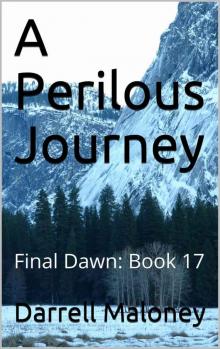 A Perilous Journey
A Perilous Journey The Yellowstone Event: Book 6: The Aftermath
The Yellowstone Event: Book 6: The Aftermath Eden Bound
Eden Bound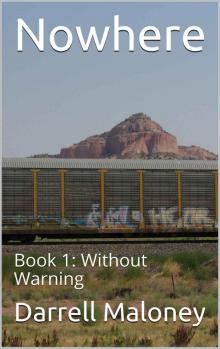 Without Warning
Without Warning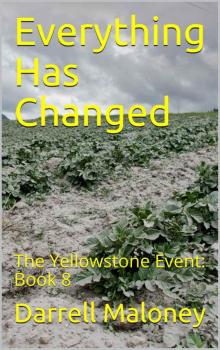 Everything Has Changed
Everything Has Changed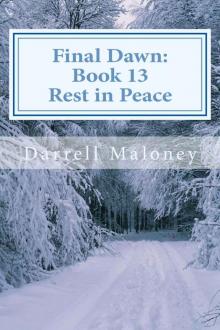 Rest in Peace
Rest in Peace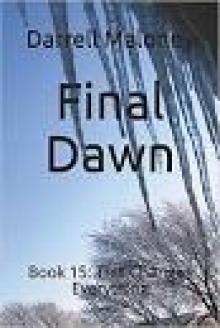 This Changes Everything
This Changes Everything The Final Chapter
The Final Chapter It Can't Be Her
It Can't Be Her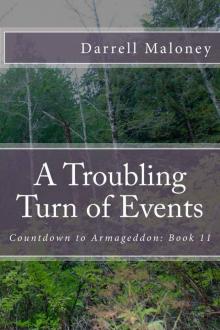 A Troubling Turn of Events
A Troubling Turn of Events The Blockade
The Blockade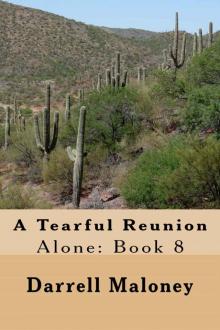 A Tearful Reunion
A Tearful Reunion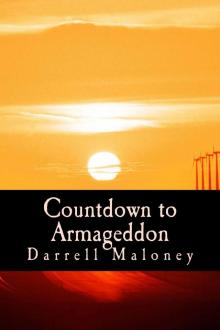 Countdown to Armageddon
Countdown to Armageddon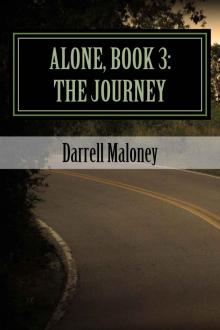 Alone, Book 3: The Journey
Alone, Book 3: The Journey The Army Comes Calling
The Army Comes Calling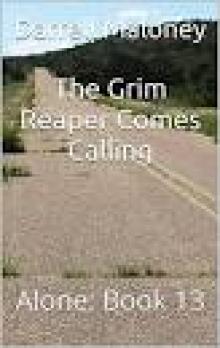 The Grim Reaper Comes Calling
The Grim Reaper Comes Calling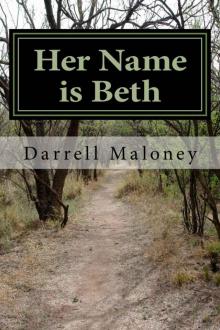 Her Name is Beth: Alone: Book 5
Her Name is Beth: Alone: Book 5 Red: The Adventure Begins
Red: The Adventure Begins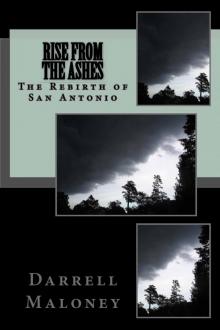 Rise From The Ashes: The Rebirth of San Antonio (Countdown to Armageddon Book 3)
Rise From The Ashes: The Rebirth of San Antonio (Countdown to Armageddon Book 3)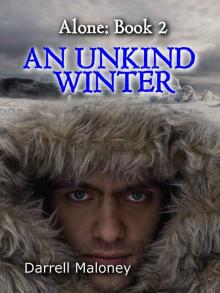 An Unkind Winter (Alone Book 2)
An Unkind Winter (Alone Book 2)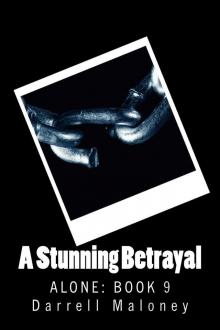 A Stunning Betrayal: Alone: Book 9
A Stunning Betrayal: Alone: Book 9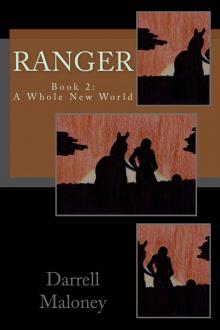 A Whole New World: Ranger: Book 2
A Whole New World: Ranger: Book 2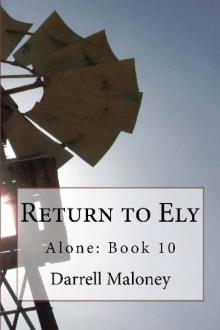 Return To Ely
Return To Ely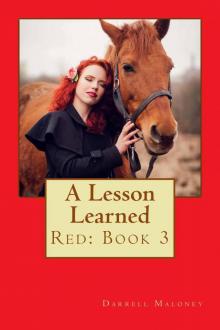 A Lesson Learned: Red: Book 3
A Lesson Learned: Red: Book 3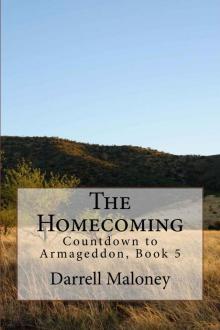 The Homecoming: Countdown to Armageddon: Book 5
The Homecoming: Countdown to Armageddon: Book 5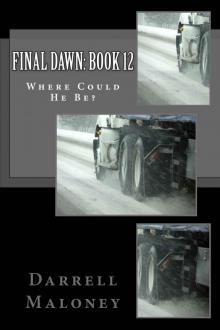 Final Dawn: Book 12: Where Could He Be?
Final Dawn: Book 12: Where Could He Be?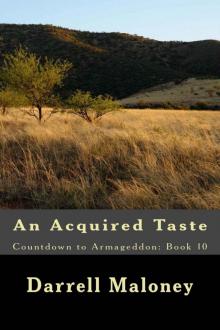 An Acquired Taste
An Acquired Taste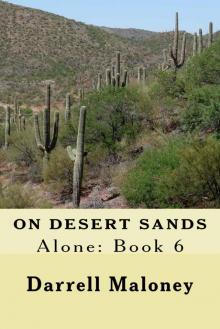 On Desert Sands: Alone: Book 6
On Desert Sands: Alone: Book 6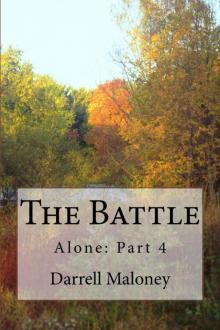 The Battle: Alone: Book 4
The Battle: Alone: Book 4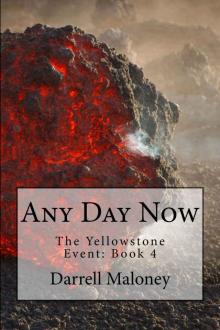 Any Day Now
Any Day Now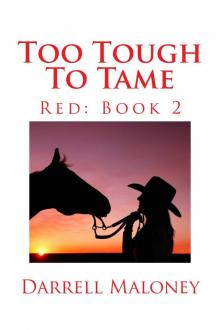 Too Tough To Tame: Red: Book 2
Too Tough To Tame: Red: Book 2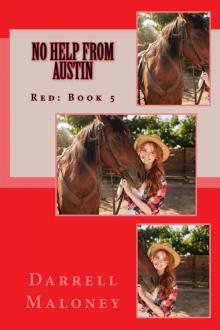 No Help From Austin: Red: Book 5
No Help From Austin: Red: Book 5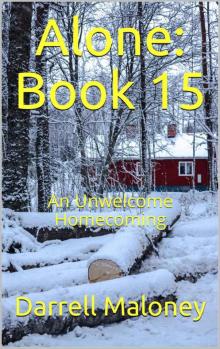 An Unwelcome Homecoming
An Unwelcome Homecoming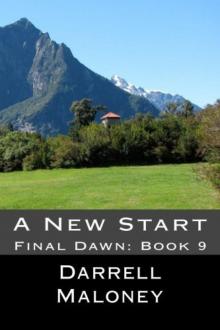 A New Start: Final Dawn: Book 9 (Volume 9)
A New Start: Final Dawn: Book 9 (Volume 9)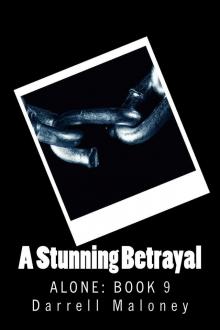 A Stunning Betrayal
A Stunning Betrayal An Undeclared War (Countdown to Armageddon Book 4)
An Undeclared War (Countdown to Armageddon Book 4)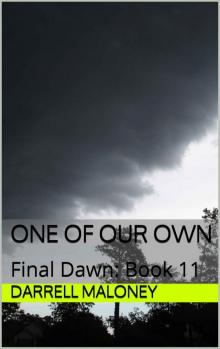 One of Our Own: Final Dawn: Book 11
One of Our Own: Final Dawn: Book 11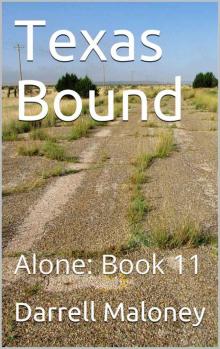 Texas Bound: Alone: Book 11
Texas Bound: Alone: Book 11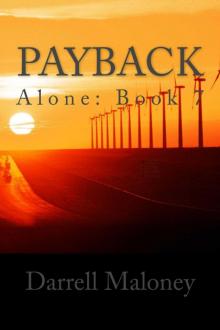 Payback: Alone: Book 7
Payback: Alone: Book 7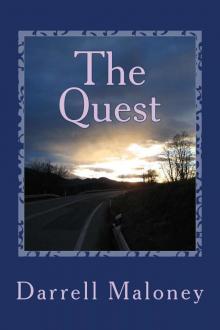 The Quest: Countdown to Armageddon: Book 6
The Quest: Countdown to Armageddon: Book 6 The Siege
The Siege The Yellowstone Event: Book 1: Fire in the Sky
The Yellowstone Event: Book 1: Fire in the Sky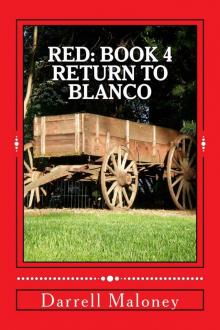 Return to Blanco (Red Book 4)
Return to Blanco (Red Book 4)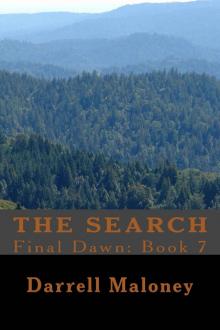 The Search
The Search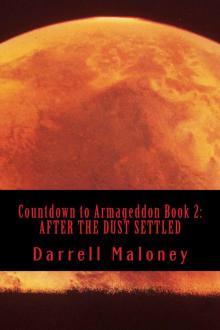 AFTER THE DUST SETTLED (Countdown to Armageddon Book 2)
AFTER THE DUST SETTLED (Countdown to Armageddon Book 2)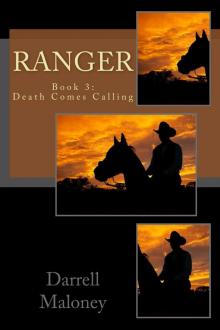 Death Comes Calling (Ranger Book 3)
Death Comes Calling (Ranger Book 3)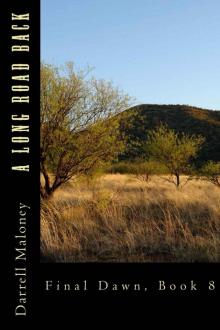 A Long Road Back: Final Dawn: Book 8
A Long Road Back: Final Dawn: Book 8